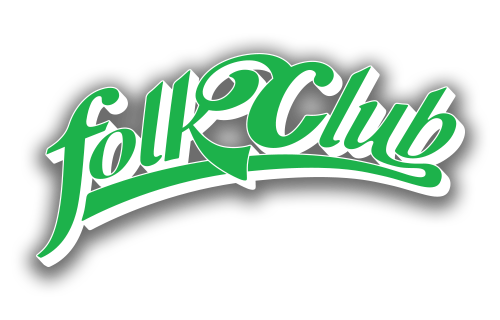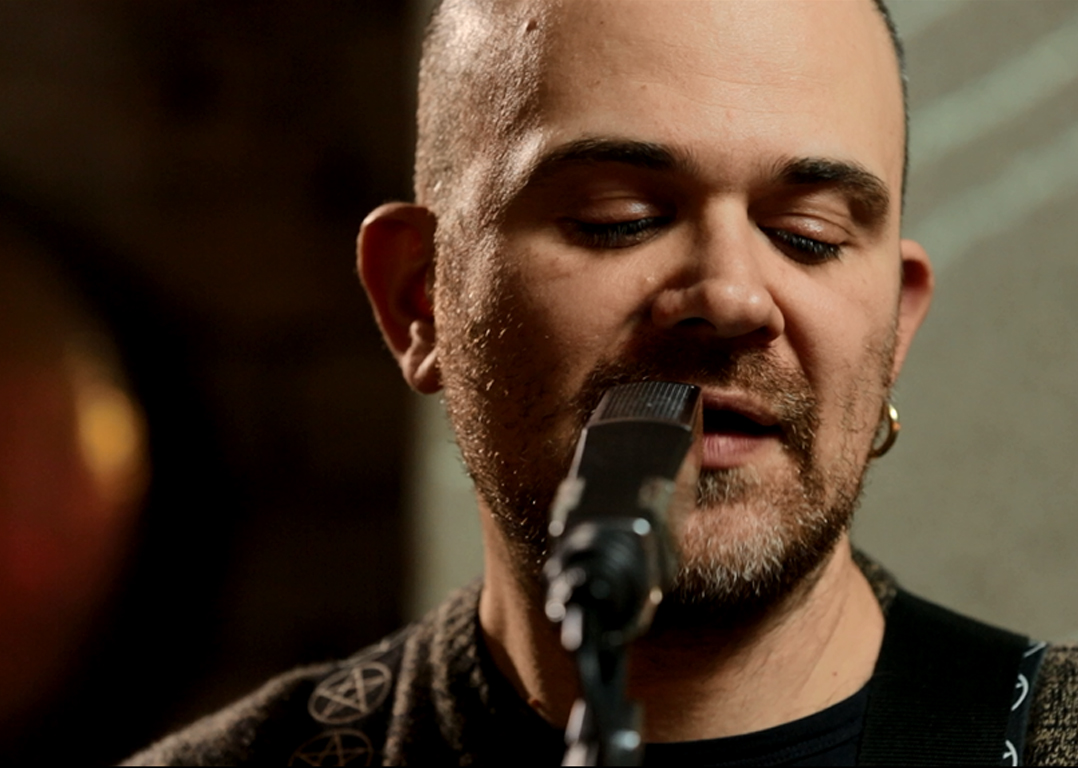

Entrance: 18.00€
Price: 5.00€
Ivan Della Mea, one of the greatest storytellers and poets of the twentieth century, is always absent from the celebrations. Ten years after his death, a book was missing that would take stock of his life and his work for the new generations, to twelve no one had yet dedicated a work of re-proposing his repertoire. Alessio Lega, anarchist singer-songwriter twice Targa Tenco who many consider the artist today the most consistent in making poetic and social songs, published a book two years ago and in these days comes out with a new CD, both entirely dedicated to the "Mea" (as friends called Ivan). His concert at the FolkClub makes use of an extraordinary contribution, namely the explosive vocal ensemble of the Dè Soda Sisters, an important reality of contemporary folk, for the first time on our stage.
If it is true that Ivan is remembered above all as an activist, Alessio also offers us the Mea poeta, the Mea narrator in Milanese (El me gatt) but also the brilliant innovator of the song in Italian (Cara moglie, La nave dei folli), author of melodies unforgettable and still unknown musical pearls. Supported by a triumphant crowdfunding campaign, Alessio's new recording project, Mea (which contains three unreleased tracks), revealed how the public has not forgotten it and has been waiting for a new meeting with Ivan Della Mea for some time. The CD Canzoniere della Rivolta is an anthology that presents all the facets of Mea in a new light, and is an indispensable tool for discovering and rediscovering an essential intellectual, perhaps today more than yesterday. The image of Ivan Della Mea is that of a storyteller who in the theater, as in the most difficult situations of struggle, takes up the guitar and harangues the strikers ... in reality the Mea collaborated all his life with musicians of great value, starting with the brilliant Paolo Ciarchi (with whom Alessio Lega had a long association). The CD and the presentation concerts, in addition to highlighting the lyrics and melodies, enrich the stereotyped and false images of songs where only the text counts with respectful and creative arrangements. Maestro Guido Baldoni on accordion and voices and Rocco Marchi on bass and percussion, intertwine a creative and engaging sound dialogue with Alessio's voice and guitar. The Dè Soda Sisters are an explosive reality of today's folk. Three singers with a very strong vocal personality, at ease even with stringed instruments and percussion, in the space of a few years, hundreds of concerts and some CDs, have become a leading group of the Tuscan music scene, with highly innovative arrangements, the result of deep study of sources and iconoclastic talent. At ease in reviews as in popular festivals, in their hands the memory of the songs is projected into the future.
Alessio Lega, born in 1972, from Lecce by birth but Milanese by 'adoption', likes to say about himself I am one of the biggest outsiders, a very apt definition. Alessio, in fact, has become part of the history of the song, is regularly included in every dictionary of the song, Gianni Mura mentions him on La Repubblica among the 100 names of the year, he has won the most coveted awards (twice Targa Tenco, Premio Lunezia), his songs are included in anthologies, books, DVDs; yet Alessio remains fundamentally an outsider, for him the song remains a passion, a choice, a space of freedom; to be able to choose who to say yes to and who to say no to, to be able to play where they like and not where they should. At the FolkClub we have often appreciated him in recent years: his were the daring projects One hundred years of songwriting in 5 concerts and Vinyls: the lost listening, real musical marathons distributed in our seasons number 28 and 29. Thanks to them we have fully enjoyed his impressive musical and cultural training, his musicality and versatility and his unique way of being on stage. Alessio Lega is a storyteller, writer and historian and as such the research and memory maintenance work is a fundamental part of his work. The language is folk, pop, rock that plays in the global square and seeks individual traits in the many masks of rebellion. His rhymes are often harsh, with a sharp irony, and they have the ability to tell stories in a perfectly clear and detailed way, in the space of a song. Singer-songwriter with 10 albums released in his name, he has been the clerk for the bills, the cartoonist for obstinacy and the musician for love and revolution. Writer and anarchist militant, he works in the field of political and trade union initiatives and collaborates with the libertarian press, with dozens of articles and many books to his credit. He is a revolutionary couch potato and engraver. He began writing and singing his first songs in public in the late 1980s and has performed regularly since 1997. A lover of the language, historian of international song, a singer with a theatrical setting linked to the French tradition, he writes with one eye on form and another on social justice. He sang in theaters and clubs around the world, but he always comes back to social centers, street parties, free theaters. Among the many musical-theatrical shows in which he participates, there is also the reinterpretation of the historian Bella Ciao directed by Riccardo Tesi and, for children, the one on the songs of Gianni Rodari. He hates money, which is reciprocated.
The Dè Soda Sisters were born in Rosignano Solvay in February 2011. The name of the group is an ironic tribute to what characterizes Rosignano Solvay: bicarbonate and its white beaches. The group, all female, which sees a union of ways of doing and saying from the province of Livorno and that of Florence, prefers small scenic spaces to hug the audience and make them feel an integral part of the concert. Street music that makes its way through squares, squares, narrow alleys and dance halls furnished with tables and candles. Hence their vast repertoire of old anarchic and popular songs, belonging to the Tuscan tradition and southern Italy. Pub starters, riotous nursery rhymes, serenades of love, fight songs and melodies of the past. The Dè Soda Sisters conquer the public for their simplicity and the exquisite naturalness of their music. A guitar, a mandolin, a cigar box, voices and percussive instruments made from spoons, graters and tambourines. Over the years they have the pleasure of performing in Tuscany, in Italy and abroad. In December 2016 they perform in Mende, France, on the occasion of the Tuscan week and the twinning with the municipality of Volterra. In May 2017 they are invited to the Zoa Festival in Austria. In August 2018 they bring their music to Germany, in Wangen, on the occasion of the twinning with the city of Prato. In March 2019 they are guests of the Primtemps Libertaire festival in Lyon. In April 2016 they won the Oltreterra Folkontest First Prize thanks to which on August 21, 2016 they performed in Asciano (Si) at the Other Popular Music Festival. On 27 January 2018 they won the Cantautorato award at the Roberto Rizzini Award, Bogon Verona Association, with an original piece written by the 6-handed trio about Rosignano Solvay La ballata della soda (vai, vai...). The musical project Dè Soda Sisters was born with the intention of giving importance to popular music by addressing all types of people and all generations.The choice of songs to be reproduced in our repertoire usually starts from the proposals of Veronica who is ours official researcher of buried musical treasures! Naturally the voices begin to follow spontaneously and instinctively, harmonizing the main melody. Nothing is decided at the table, but the tests follow the intuition of the moment. You improvise something with the guitar, with percussion, with the mandolin and expect the piece to come by itself. And when it happens, it's really fun. Often the finished piece differs a little from the original, because you never manage not to put our own, Benedetta's swinging riffs, Veronica's percussive and sound ideas, Lisa's mix of genres and stops, the differences of our voices and our approaches and styles then become embellishments to which we become attached! The main reason is that we cannot do otherwise. Having fun playing together important pieces for their historical relevance for which we always have a great respect. Our next goal is to bring this fun to someone, be it a child, a teenager, an adult, an elderly person. When this happens we are always very happy because it means that we have managed to carry on a little bit the memory of a fundamental treasure like popular music! Popular music is the set of musical compositions, sung or not, which respond to a certain popular cultural model, usually corresponding to the lower level of society.
The type of music changes from place to place, from north to south, from the mountains to the sea. The popular musical genre basically has three characteristics: simplicity of melodies, which is useful for memorization. In fact, in ancient times the lower social classes, not knowing how to read and write, used oral transmission as a means of communication and memory. The second feature is functionality, in fact popular music was born with a very specific purpose. The third feature is oral transmission which occurs mostly by imitation. We can even speak of Collective Creation precisely because, being transmitted from the older generations to the younger ones in an oral way, the words and the music also changed in a very radical way. Popular sung music includes: lullabies, nursery rhymes, love songs, serenades, wrestling songs, work songs, laments, ditties, tavern songs, peasant songs.
Why is it important to keep popular music alive?
Because it is a living and concrete socio-anthropological document, which illustrates the uses and customs, the characteristics of a given people, as well as its social changes in different historical moments. It brings us back to the flavors, smells, crafts of the past, to conviviality, simple things, love and respect for nature. It has the power to ignite emotions and feelings of anger and love for certain human conditions, which the history books do not talk about and helps us to interpret today's reality, because not much has changed. Time passes, time changes and with it the music. The world is different from 100 years ago, society, people, the media. Our society is more hectic and individualistic. But many concepts expressed by popular songs are still extremely current, so much so that they are unsettling! As we read on a wall in Cefalù: Tradition is to be considered a living and constantly evolving material, only memory remains. (Veronica Bigontina)
At FolkClub Alessio Lega (vocals and guitar) is accompanied on accordion and vocals by Maestro Guido Baldoni, on bass and percussion by Rocco Marchi and on choral voices by the Dè Soda Sisters (Benedetta Pallesi, Veronica Bigontina and Lisa Santinelli).